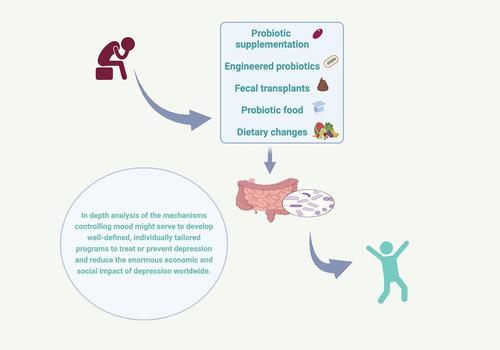当前位置:
X-MOL 学术
›
Pharmacol. Rev.
›
论文详情
Our official English website, www.x-mol.net, welcomes your
feedback! (Note: you will need to create a separate account there.)
Intestinal Barrier, Immunity and Microbiome: Partners in the Depression Crime
Pharmacological Reviews ( IF 19.3 ) Pub Date : 2024-09-01 , DOI: 10.1124/pharmrev.124.001202 Eva M Medina-Rodríguez 1 , José Martínez-Raga 2 , Yolanda Sanz 2
Pharmacological Reviews ( IF 19.3 ) Pub Date : 2024-09-01 , DOI: 10.1124/pharmrev.124.001202 Eva M Medina-Rodríguez 1 , José Martínez-Raga 2 , Yolanda Sanz 2
Affiliation

|
Depression is a highly prevalent disorder and a leading cause of disability worldwide. It has a major impact on the affected individual and on society as a whole. Regrettably, current available treatments for this condition are insufficient in many patients. In recent years, the gut microbiome has emerged as a promising alternative target for treating and preventing depressive disorders. However, the microbes that form this ecosystem do not act alone but are part of a complicated network connecting the gut and the brain that influences our mood. Host cells that are in intimate contact with gut microbes, such as the epithelial cells forming the gut barrier and the immune cells in their vicinity, play a key role in the process. These cells continuously shape immune responses to maintain healthy communication between gut microbes and the host. In this article, we review how the interplay among epithelial cells, the immune system, and gut microbes mediates gut-brain communication to influence mood. We also discuss how advances in our knowledge of the mechanisms underlying the gut-brain axis could contribute to addressing depression.
中文翻译:

肠道屏障、免疫和微生物组:抑郁症犯罪的同伙
抑郁症是一种非常普遍的疾病,也是全世界残疾的主要原因。它对受影响的个人和整个社会产生重大影响。遗憾的是,目前针对这种情况的可用治疗方法对许多患者来说是不够的。近年来,肠道微生物组已成为治疗和预防抑郁症的有前景的替代目标。然而,形成这个生态系统的微生物并不是单独行动,而是连接肠道和大脑的复杂网络的一部分,影响我们的情绪。与肠道微生物密切接触的宿主细胞,例如形成肠道屏障的上皮细胞及其附近的免疫细胞,在此过程中发挥着关键作用。这些细胞不断塑造免疫反应,以维持肠道微生物与宿主之间的健康沟通。在本文中,我们回顾了上皮细胞、免疫系统和肠道微生物之间的相互作用如何介导肠脑通讯以影响情绪。我们还讨论了我们对肠-脑轴机制的了解的进步如何有助于解决抑郁症。
更新日期:2024-08-15
中文翻译:

肠道屏障、免疫和微生物组:抑郁症犯罪的同伙
抑郁症是一种非常普遍的疾病,也是全世界残疾的主要原因。它对受影响的个人和整个社会产生重大影响。遗憾的是,目前针对这种情况的可用治疗方法对许多患者来说是不够的。近年来,肠道微生物组已成为治疗和预防抑郁症的有前景的替代目标。然而,形成这个生态系统的微生物并不是单独行动,而是连接肠道和大脑的复杂网络的一部分,影响我们的情绪。与肠道微生物密切接触的宿主细胞,例如形成肠道屏障的上皮细胞及其附近的免疫细胞,在此过程中发挥着关键作用。这些细胞不断塑造免疫反应,以维持肠道微生物与宿主之间的健康沟通。在本文中,我们回顾了上皮细胞、免疫系统和肠道微生物之间的相互作用如何介导肠脑通讯以影响情绪。我们还讨论了我们对肠-脑轴机制的了解的进步如何有助于解决抑郁症。































 京公网安备 11010802027423号
京公网安备 11010802027423号